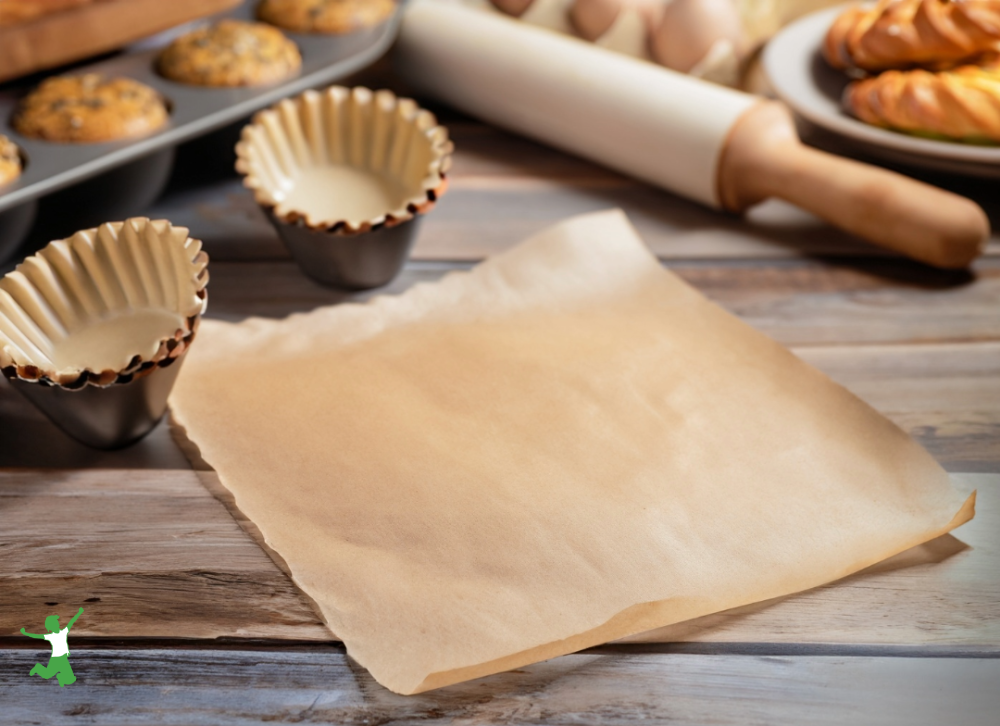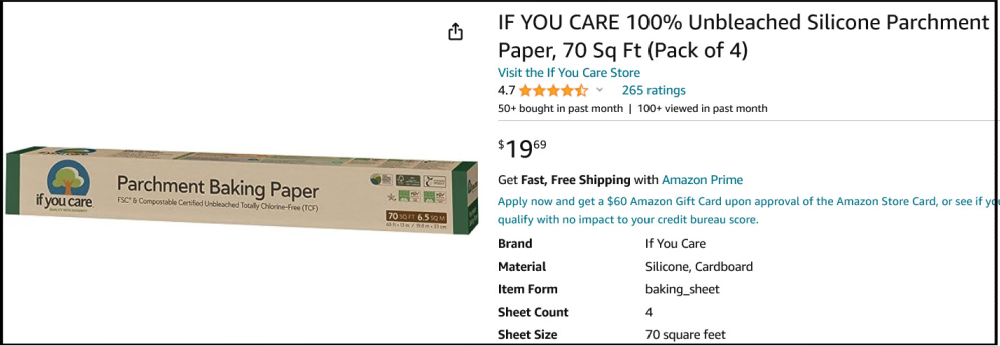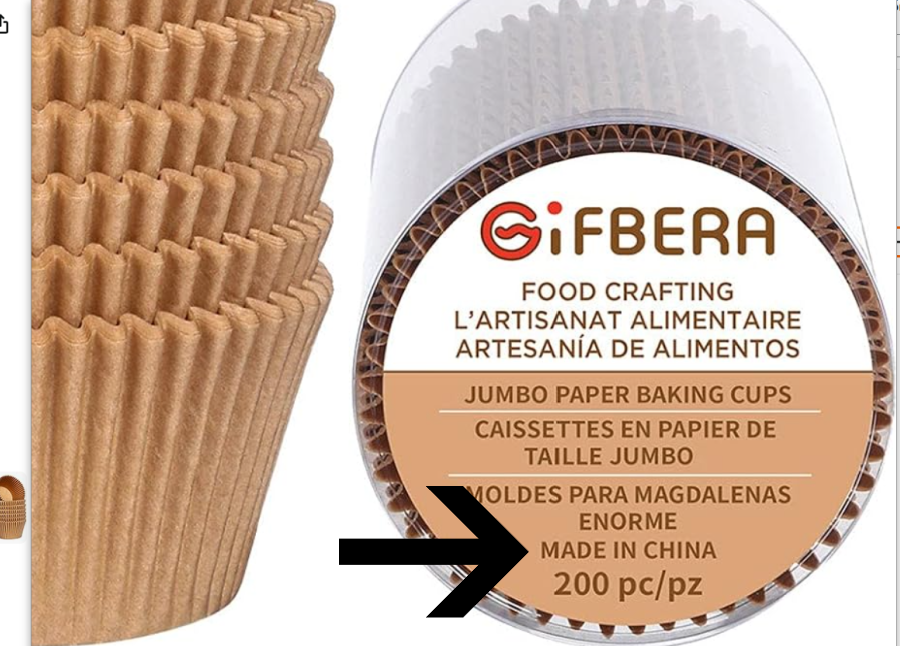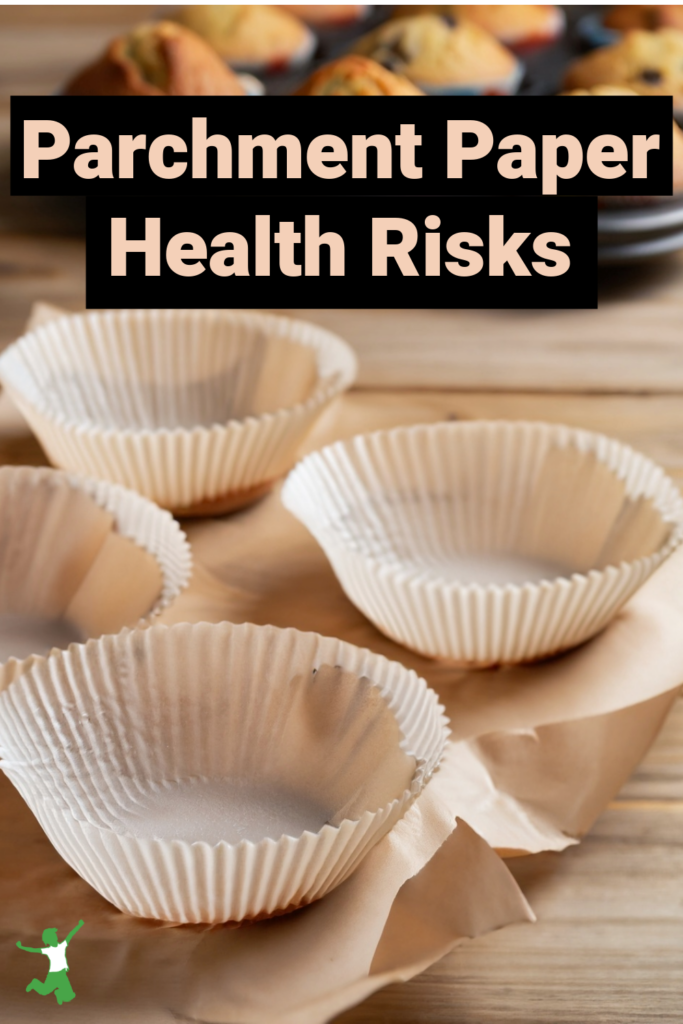Table of Contents[Hide][Show]
The major health risks of unbleached and PFAS-free parchment paper products and why Grandma’s alternative method is the best approach after all.

I’ve made a major upgrade over the past few years to my baking routine, and I wanted to share this important change with all of you!
I no longer use parchment paper or baking cups of any size or brand in my baking routine at all.
Those of you who have been reading this blog for a long time will remember that I used to use it to cover my aluminum bakeware to protect the food from heavy metal exposure.
Little did I know at the time that I was swapping one set of toxins for another!
When I suggest ditching ALL brands of parchment paper, this includes unbleached brands such as “If You Care” which consistently receives high accolades for safety and has many “green” certifications such as compostable and biodegradable as well as the coveted EU Ecolabel. (1)
I’ve warned before that “green” products are not necessarily healthy.
Unbleached parchment paper of all sizes and varieties is a prime example!
Unbleached Parchment Paper Isn’t Safe (even if PFAS-free)
While bleached parchment paper is quite obviously best avoided due to the potential for chlorine residues from the bleaching process, the danger from unbleached varieties is more stealthy.
While marketed as “chlorine-free”, unbleached baking paper is actually coated with silicone.
What exactly is silicone anyway? Is it the same thing as silicon, the natural element with the chemical symbol Si and atomic number 14?
They are far from the same thing, as it turns out!

Synthetic Rubber
According to Scientific American, silicone is a synthetic rubber. Its chemical name is siloxane.
Silicone [siloxane], a synthetic rubber made of bonded silicon (a natural element abundant in sand and rock) and oxygen, is increasingly filling this niche. The flexible yet strong material, which has proven popular in muffin pans, cupcake liners, spatulas and other utensils, can go from freezer to oven (up to 428 degrees Fahrenheit), is non-stick and stain-resistant, and unlike conventional cookware, comes in a range of bright and cheery colors. (2)
Sounds so safe, doesn’t it?
Manufacturers know that conflating an artificial material with a natural one by making their names virtually identical makes it so easy to confuse the public!
While manufacturers insist that silicone is safe and inert, I beg to differ.
Silicone Leaches into Food
Studies have shown that silicone can migrate into food at normal cooking and baking temperatures.
Even though silicone elastomers demonstrate a high degree of thermal stability and excellent resistance to aging, high temperatures lead to depolymerization of the elastomer, with subsequent volatilization and migration [into food] of certain substances. (3)
Inflammatory Effects
In addition, medical devices that contain silicone implanted in the body have shown deleterious health effects.
Thus, it would seem that silicone that is ingested may very well pose health risks. This would include an inflammatory response at minimum. (4)
In fact, it seems to me that the FDA has completely dropped the ball on investigating whether siloxanes are as “inert” as claimed especially when it comes to their widespread use in silicone baking molds and kitchenware.
No follow-up studies have ever been done since 1979 to assess this important question with regard to the implications for long-term health. (5)
Endocrine Disruption, Tumors, Cancer
While the FDA hasn’t done much to ensure silicone is safe, the EU has.
The European Union classifies siloxanes as a Class 1 endocrine disruptor. (6)
In addition, silicone, aka siloxanes, can cause uterine tumors and reproductive issues, possibly even leading to infertility. (7)
The final nail in the coffin is that siloxanes are also a carcinogen and can cause liver damage. (8)
Unbleached parchment paper coated with siloxane doesn’t sound so inert and safe anymore, does it?
No wonder they picked the euphemism “silicone” for this toxic substance!
How to Ditch Parchment Paper for GOOD
Since ditching unbleached parchment paper several years ago, I’ve been baking the old-fashioned way.
Just like my Grandma did! Turns out (for the umpteenth time), that she really DID know best!
I grease and flour muffin cups, pizza pans, and cookie sheets before adding the dough and placing it in the oven.
I am also now using stainless steel baking sheets and pans (this brand).
UPDATE: I recently found this safe brand of uncoated cooking parchment which works great for cookies and bread as well as steaming or broiling meat and veggies!
Gifbera Jumbo Cupcake Liners
Please note that the Gifbera Jumbo Cupcake Liners made of “naturally greaseproof” 100% spruce wood pulp are being touted on social media as a safe alternative to parchment paper.
However, I personally would never use this product for a couple of reasons:
First, they are manufactured in China (imported from Germany).
Secondly, in China, spruce wood pulp is almost exclusively a fully chemicalized process. There is a high probability that anything made from the industrialized spruce wood pulp would contain residues of these caustic chemicals.

“Grease and Flour” Approach
There is no magic to greasing and flouring a baking surface.
Simply slather a thin film of healthy, high smokepoint fat on the surface of the pan(s) that will contact the food.
Then, sprinkle a bit of flour over the top. You can use your fingers to do this (a pinch of flour at a time). That’s what I do.
Or, you can use a small strainer.
The flour does not need to totally cover the greased portion of the pan, and you don’t need to mix it into the oil.
That’s all there is to it!
I use expeller-pressed “no taste” coconut oil and a dusting of homemade gluten-free sprouted flour blend for this task.
The good news is that this method works spectacularly well.
Your cupcakes will pop out of those muffin pans just as easily as a toxic unbleached baking cup.
Cookies will slide off the cookie sheet with a spatula quickly and 100% intact.
The downside is…
More Time, Bigger Mess
The extra step to grease and flour baking pans and cookie sheets definitely takes more time.
In addition, it can be a bit messy at first until you get the hang of it.
Soaking or even elbow grease is sometimes necessary to get those muffin tins and cookie sheets clean too.
Even still, I feel so much better doing it this way.
I’ve taken great care to source the ingredients properly, it would be such a shame to wreck the dish with a toxic silicone residue from a greenwashed “chlorine and PFAS-free” product!
What About Unheated Uses?
While the danger of using unbleached, silicone-coated parchment paper for baking is cut and dry, what about uses at room or refrigerated temperature?
The health issues from using unbleached parchment paper are markedly less for this scenario.
However, after careful thought, I’ve chosen not to use it at all. The research coming out about the dangers of siloxanes is just too concerning!
The potential for residue in the food is still present even at room temperature or in the refrigerator/freezer.
Silicone is not something I want in my body even in the tiniest amounts given that it is a persistent toxin in the environment.
Since there are safer products to wrap and store food, I felt most comfortable ditching any and all forms of unbleached parchment paper.
Have you realized the dangers of parchment paper to your long-term health? What steps have you taken to eliminate it from your baking routine?

(1) If You Care Certifications
(2) Silicone Tally: How Hazardous Is the New Post-Teflon Rubberized Cookware
(3) Heat stability and migration from silicone baking molds
(4, 5) Is Silicone a Plastic?
(6, 7) The Dirty Dozen: Siloxanes
(8) What are Siloxanes: Chemical Free Living








I thought the type of stainless steel matters – 18/10 or 18/8 (chromium/nickel) ?
Any recommendations for a Made in the USA brand ?
What do you think of enamel baking sheets and muffin tins? You know – the splattered ones. All I can find anymore (on the internet, anyway) are antique ones at Etsy, which is odd, because only 5 years ago I found some of the brown enamel baking sheets at Jungle Jim’s. They are good quality, not the lightweight cheap tinny items you see in some places. Jungle Jim’s is the largest grocery store on earth; it’s in Fairfield, Ohio.
I don’t trust or use them as the manufacturer’s won’t supply a full, transparent list of materials used during manufacturing.
What do you use for baking bread? I set my sourdough loaf onto parchment and put it into a cast iron pan and cover it. Thank you.
I use pyrex glass bread pans.
Is this the same for silicone sheets that you buy to line our aluminum baking sheets? They have been touted to be “safer” than aluminum. I didn’t see any articles on your website about these silicone sheets. Can you address those?
Yes these are coated with silicone. They are not safer. It’s a bait and switch.
https://www.thehealthyhomeeconomist.com/silicone-molds-baking-safety/
What do you do about coffee filters?
I don’t drink coffee, so have not investigated these products.
What about for those who are Gluten Free. Can’t use flour.
The flour I use is typically a homemade gluten-free blend (or einkorn). https://www.thehealthyhomeeconomist.com/sprouted-gluten-free-flour-recipe/
If grain free, you can use cassava flour. https://www.thehealthyhomeeconomist.com/cassava-benefits-starch-flour/
Can’t we continue with bleached parchment? Bleach burns off doesn’t it?
Bleached parchment paper is also coated, so not advisable to use that either.
What types of bake ware do you recommend? Besides Pyrex most items are aluminum, which I believe is unsafe, and of course any pan with a non stick surface is definitely not ok. I know it’s possible to find some cast iron, but do you use stainless steel cookie sheets? Thank you for all your work!
Yes, I use stainless steel bakeware except for bread pans (pyrex glass).
I have been using parchment paper for years! Since I learned about it from Martha Stewart when she had her morning 9 am show. Will the silicone leave my body when I discontinue parchment paper use or do I have to specifically detox it out?
This is very disturbing news to me.
Thank you for the information. What are your baking pans made of? Will greasing and flouring pans protect from aluminum exposure? Doesn’t seem like it would to me.
I use stainless steel baking pans except for my bread pans, which are pyrex glass.
I don’t know how well the body detoxes silicone. It is a hormone disruptor too, unfortunately 🙁 Anything that stimulates the body’s elimination channels should prove helpful such as Epsom salt baths, raw milk (high in glutathione), fresh wheatgrass juice (NOT powdered), DE, bone broth, homemade 24 hour kefir are some ideas to consider for gentle and safe detoxing.
Greasing and flouring on aluminum is probably not a good idea. I replaced all of my baking pans when I stopped using parchment paper.
You could also try doing organic castor oil packs to help detox your lymph.
Hello Sarah,
I bought some silicone muffin cups and a basket tray for my air fryer. I also use unbleached filter papers for my coffee maker. How safe are these items? Please let me know if I made a big mistake or not.
Thank you for your time,
Loretta Thompson
Silicone bakeware is not safe. https://www.thehealthyhomeeconomist.com/silicone-molds-baking-safety/
I don’t know about the coffee filters. I don’t drink coffee and so have not encountered this product to look into it.
I’m wondering if the coffee filters are coated?? I’ll bet they are not. Email the company that you use and ask. I really don’t drink coffee either, but my husband does. His do not feel coated. Here is what he uses and he uses their pour over glass brewers. I’ve emailed the company to double check on the silicone on the filters.
https://www.chemexcoffeemaker.com/chemex-reg-bonded-filters-pre-folded-squares-natural.html
I have not looked at coffee filters as my husband and I do not drink coffee (although I do make an occasional espresso after holiday meals using a traditional Italian stovetop espresso maker that doesn’t use paper filters).